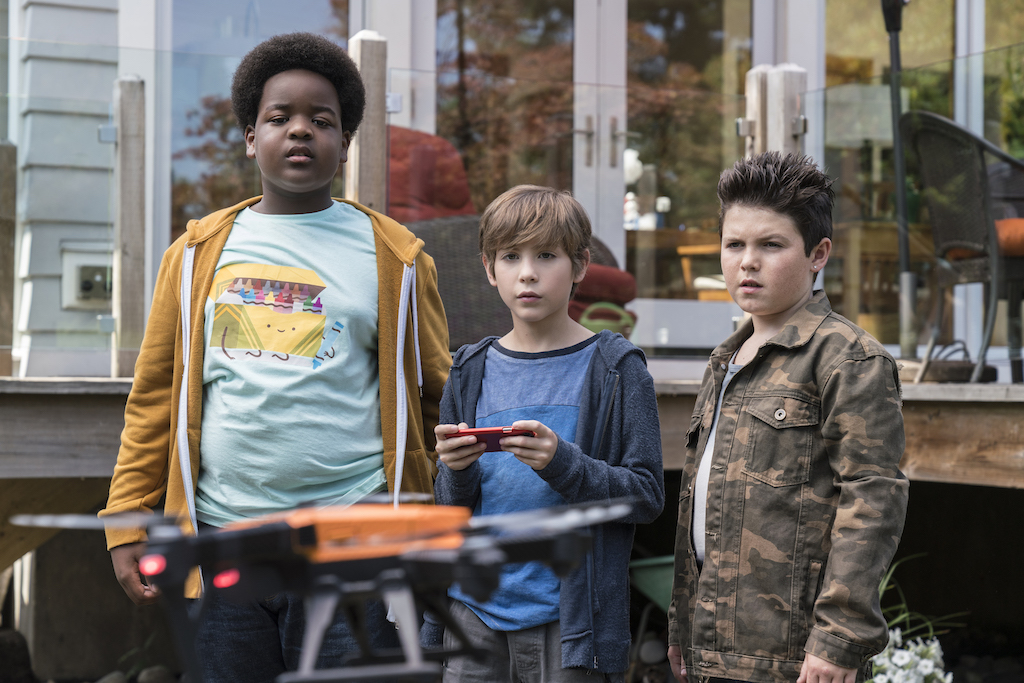
The three tween best friends at the center of Good Boys refer to themselves as “The Bean Bag Club” (an endearingly literal-minded nickname based on their affection for bean bags) so many times, I began to wonder if that was an early title of the film. If so, I’m glad they went with the slightly generic alternative. It fits. The most charming thing about Good Boys is that the three buds are, indeed, good boys. Their parents only exist in the margins of the film, but in some ways, they are front and center, having instilled their sons with sound liberal values. The boys hate drugs (“they destroy lives and communities” they recite solemnly), they respect authority (almost to a fault), and, most significantly, they consider sexual consent a sacred trust.
This is particularly important because our hero Max (Jacob Tremblay) is suddenly interested in girls—one girl, in fact, a pretty skater named Brixlee (Millie Davis), whom Max stares at, in slack-jawed admiration, whenever he encounters her. Because this is the beginning of sixth grade, they negotiate through intermediaries: If Max admits he has a crush on Brixlee, her best friend reports, she might admit that she has a crush back. (This detail tugged at a long dormant memory of my own sixth grade deal making.) And now, looming in the near future: a basement kissing party that both Max and his buds, Lucas (Keith L. Williams) and Thor (Brady Noon), and Brixlee have been invited to. They have to learn how to kiss—and fast.
Good Boys is about that particular developmental time when a trio of best friends might be at completely different levels of maturity. One brags that he has “six pubes.” They all think beer tastes gross. Lucas is extremely attached to his parents, cheerfully telling them every (sometimes outrageously sordid) detail of his young life. They wisely talk about things they only partially understand (“a nymphomaniac is someone who has sex on both land and sea,” Max reports). But only Max has truly become sex obsessed.
Because this film is brought to you by the Seth Rogen-led production team that created Superbad, Sausage Party, and Neighbors, you know there’s going to be plenty of raunchiness and drug-related mischief ahead. One of the film’s ongoing gags is that Thor’s parents have a very, um, robust sex life, so the kids are constantly misidentifying sex toys for things they are not. Most amusingly, they mistake a sex doll for a CPR doll. They decide to practice kissing on the doll, and this is the first time we encounter their consent evangelism. “Wait! You didn’t ask for consent!” Lucas says earnestly, as Max leans in for a pucker.
Good Boys is the kind of film where the “plot” is merely an excuse to put the characters in increasingly absurd situations, but even by those loose standards, it’s a bit flimsy. Basically, the boys use a drone belonging to Max’s father (Will Forte) to spy on a teenage girl (Molly Gordon) whom they think must be a kissing expert; the drone crashes; she ends up with the drone and they somehow manage to steal the molly she and her friend (Midori Francis) were planning on taking for a wild night out on the town. An elaborate cat and mouse game ensues.
Although Good Boys largely plays like a tween version of Superbad—with an explicit nod to Stranger Things and even a touch of Stand By Me—it’s clear that writers Lee Eisenberg and Gene Stupnitsky (who also directs) are fans of the great old Tom Cruise vehicle, Risky Business, too. Just as Cruise’s Joel Goodson was racing against the clock to retrieve his parents’ precious crystal egg, Max is determined to get the drone back before his father knows he took it.
There are lots of laughs in Good Boys and the trio of young actors are top notch. Tremblay, with his “sad eyes” and tossled hair, has already established himself as a pint-sized movie star, but Williams is particularly funny as the sweetest of them all, a nervous tween narc (“we have drugs!” he blurts out to an indifferent cop), who has the misfortune of looking like an 18 year old. Noon nails the “theater kid who desperately wants to be cool” vibe.
As outrageous as the jokes and scenarios get—a drug deal at a frat house, a death defying sprint across a crowded highway—the film never loses sight of the fact that these are really nice boys. (On top of all the sex jokes, there’s a family-friendly joke about the boys battling the scourge of child-proof drug caps.) And, as in Superbad, there’s a poignance here as well. Childhood friendships are wonderful, magical—and, yes, generally ephemeral. Good Boys knows this. It adds a slightly bittersweet undertone to all the mayhem. For all its stupid fun, Good Boys is pretty darn smart.
